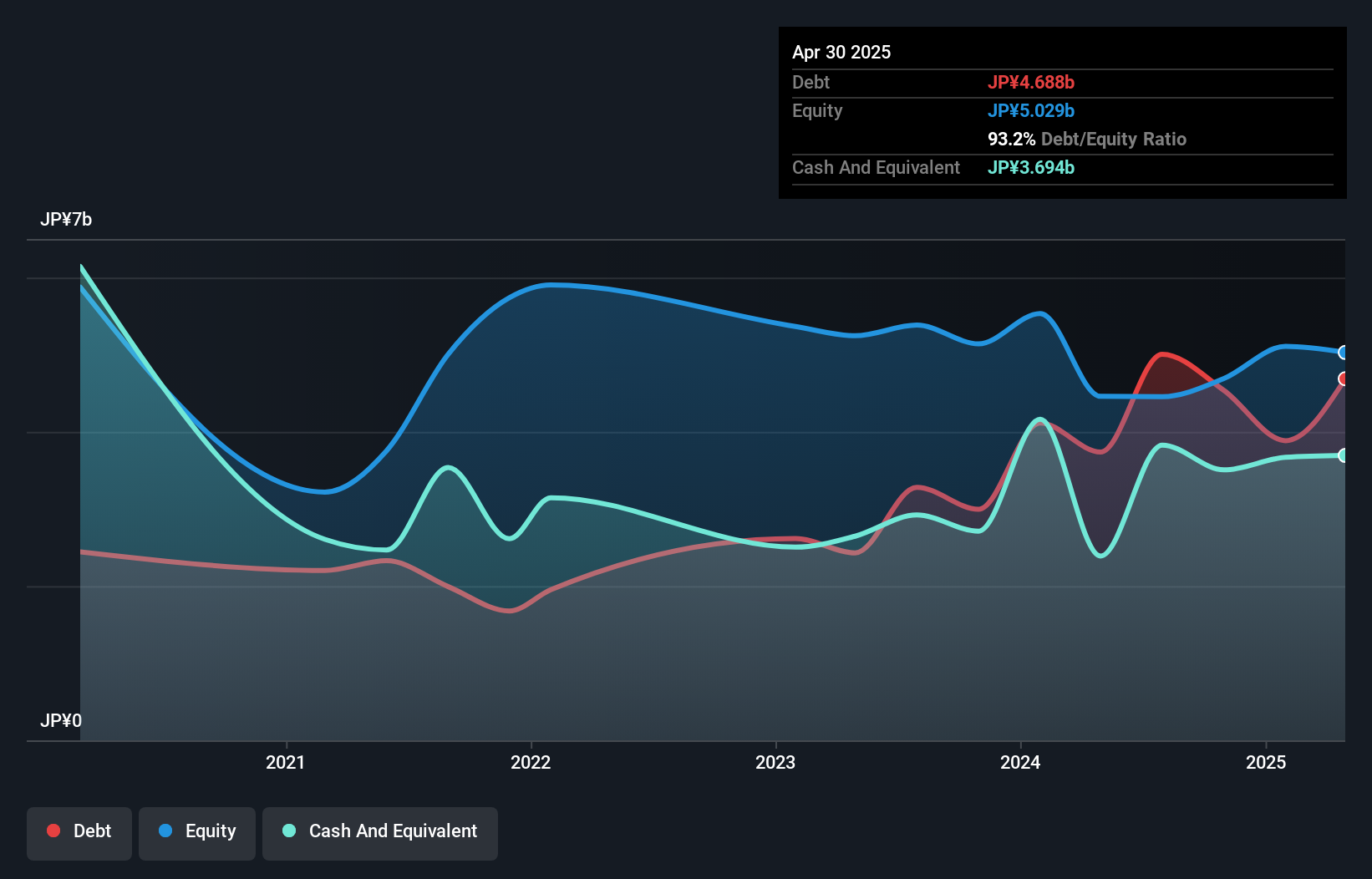- Japan
- /
- Specialty Stores
- /
- TSE:3415
These 4 Measures Indicate That TOKYO BASELtd (TSE:3415) Is Using Debt Reasonably Well
Some say volatility, rather than debt, is the best way to think about risk as an investor, but Warren Buffett famously said that 'Volatility is far from synonymous with risk.' So it seems the smart money knows that debt - which is usually involved in bankruptcies - is a very important factor, when you assess how risky a company is. We note that TOKYO BASE Co.,Ltd. (TSE:3415) does have debt on its balance sheet. But should shareholders be worried about its use of debt?
Why Does Debt Bring Risk?
Debt is a tool to help businesses grow, but if a business is incapable of paying off its lenders, then it exists at their mercy. Ultimately, if the company can't fulfill its legal obligations to repay debt, shareholders could walk away with nothing. However, a more usual (but still expensive) situation is where a company must dilute shareholders at a cheap share price simply to get debt under control. By replacing dilution, though, debt can be an extremely good tool for businesses that need capital to invest in growth at high rates of return. The first step when considering a company's debt levels is to consider its cash and debt together.
What Is TOKYO BASELtd's Net Debt?
You can click the graphic below for the historical numbers, but it shows that as of April 2025 TOKYO BASELtd had JP¥4.69b of debt, an increase on JP¥3.74b, over one year. However, because it has a cash reserve of JP¥3.69b, its net debt is less, at about JP¥994.4m.

A Look At TOKYO BASELtd's Liabilities
According to the last reported balance sheet, TOKYO BASELtd had liabilities of JP¥5.92b due within 12 months, and liabilities of JP¥2.15b due beyond 12 months. Offsetting this, it had JP¥3.69b in cash and JP¥1.49b in receivables that were due within 12 months. So its liabilities total JP¥2.89b more than the combination of its cash and short-term receivables.
Since publicly traded TOKYO BASELtd shares are worth a total of JP¥19.7b, it seems unlikely that this level of liabilities would be a major threat. But there are sufficient liabilities that we would certainly recommend shareholders continue to monitor the balance sheet, going forward.
View our latest analysis for TOKYO BASELtd
We use two main ratios to inform us about debt levels relative to earnings. The first is net debt divided by earnings before interest, tax, depreciation, and amortization (EBITDA), while the second is how many times its earnings before interest and tax (EBIT) covers its interest expense (or its interest cover, for short). This way, we consider both the absolute quantum of the debt, as well as the interest rates paid on it.
TOKYO BASELtd has a low net debt to EBITDA ratio of only 0.51. And its EBIT easily covers its interest expense, being 53.6 times the size. So we're pretty relaxed about its super-conservative use of debt. In addition to that, we're happy to report that TOKYO BASELtd has boosted its EBIT by 78%, thus reducing the spectre of future debt repayments. When analysing debt levels, the balance sheet is the obvious place to start. But it is future earnings, more than anything, that will determine TOKYO BASELtd's ability to maintain a healthy balance sheet going forward. So if you want to see what the professionals think, you might find this free report on analyst profit forecasts to be interesting.
But our final consideration is also important, because a company cannot pay debt with paper profits; it needs cold hard cash. So it's worth checking how much of that EBIT is backed by free cash flow. During the last three years, TOKYO BASELtd produced sturdy free cash flow equating to 51% of its EBIT, about what we'd expect. This cold hard cash means it can reduce its debt when it wants to.
Our View
The good news is that TOKYO BASELtd's demonstrated ability to cover its interest expense with its EBIT delights us like a fluffy puppy does a toddler. And that's just the beginning of the good news since its EBIT growth rate is also very heartening. Looking at the bigger picture, we think TOKYO BASELtd's use of debt seems quite reasonable and we're not concerned about it. After all, sensible leverage can boost returns on equity. There's no doubt that we learn most about debt from the balance sheet. However, not all investment risk resides within the balance sheet - far from it. These risks can be hard to spot. Every company has them, and we've spotted 1 warning sign for TOKYO BASELtd you should know about.
If you're interested in investing in businesses that can grow profits without the burden of debt, then check out this free list of growing businesses that have net cash on the balance sheet.
Valuation is complex, but we're here to simplify it.
Discover if TOKYO BASELtd might be undervalued or overvalued with our detailed analysis, featuring fair value estimates, potential risks, dividends, insider trades, and its financial condition.
Access Free AnalysisHave feedback on this article? Concerned about the content? Get in touch with us directly. Alternatively, email editorial-team (at) simplywallst.com.
This article by Simply Wall St is general in nature. We provide commentary based on historical data and analyst forecasts only using an unbiased methodology and our articles are not intended to be financial advice. It does not constitute a recommendation to buy or sell any stock, and does not take account of your objectives, or your financial situation. We aim to bring you long-term focused analysis driven by fundamental data. Note that our analysis may not factor in the latest price-sensitive company announcements or qualitative material. Simply Wall St has no position in any stocks mentioned.
About TSE:3415
Solid track record with excellent balance sheet.
Market Insights
Community Narratives


Recently Updated Narratives


The Quiet Giant That Became AI’s Power Grid


Nova Ljubljanska Banka d.d will expect a 11.2% revenue boost driving future growth



